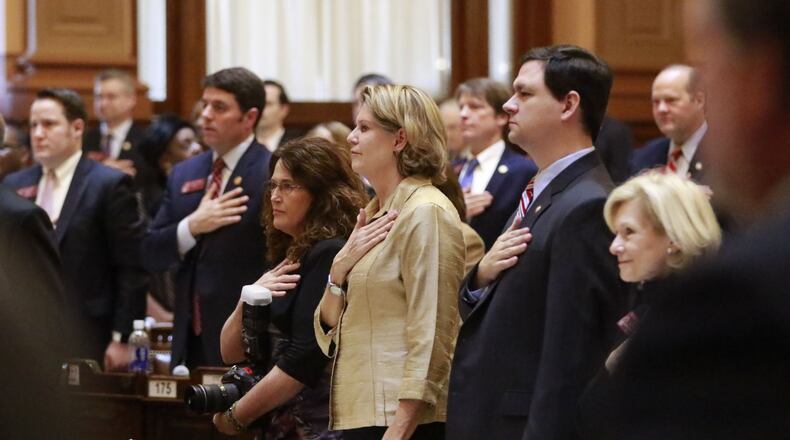The Georgia General Assembly convenes next week with virtually the same cast of characters who left the Gold Dome last March.
In November all but four incumbents won their race to retain their seat, although “won” is a misleading term.
According to the Center for Money on State Politics, Georgia was one of the least competitive states in the nation, with 81 percent of incumbents running unopposed in the general election. Moreover, even the handful of open seats didn’t attract competition, with 82 percent of those seats with only one name on the November ballot.
That’s not a functioning democracy, folks.
“Georgia is always at the bottom,” said Pete Quist, chief researcher for the Montana-based institute, which produces regular reports ranking competitiveness among states. “Typically what you would like to see in a strong democracy is the ability for voters to choose.”
There are a lot of reasons why legislative races in the state favor incumbents so heavily, but money is a big part of it. Because candidates can roll over their campaign accounts from one election to the next (not every state allows this), incumbents start off with a cash advantage.
Quist said there are some broad patterns that effect monetary competitiveness. Chief among them is that incumbents don’t get their money from you or me. Instead, they rely on contributions from political action committees set up by companies or entire industries to build their war chests.
These PACs spread their money far and wide, but almost always to incumbents, Quest said.
“These groups give to the incumbents often regardless of their party,” he said. “They just want ears in the room.”
In the 2016 election cycle, lawmakers running for reelection received $14.6 million in donations from political action committees representing the most powerful special interests in the state.
The list of PACs giving more than $100,000 is topped by the associations for the trial lawyers, doctors, dentists, hospitals, bankers, Realtors and car dealers, along with big corporate names like At&T, Comcast and tobacco giant Altria. That all gave and they gave to incumbents in both parties.
Challengers received a pittance from PACs — just $387,938 statewide.
That’s stunning. I’ll do the math for you: For every dollar a challenger receives from corporate PACs, incumbents get $38.
Lopsided races dominate
The imbalance between incumbent and challenger is almost too much to fathom. Take, for instance, the House District 7 race, which pit local high school coach Sam Snider against Speaker of the House David Ralston in the Republican primary.
Combined the candidates raised $740,097, but that’s a little like saying that Nick Saban and I have combined to win five national championships, since Snider raised a little over $12,000 and Ralston picked up the rest. Ralston, R-Blue Ridge, actually out-raised three incumbent U.S. congressmen, along with everybody else in the General Assembly.
After Ralston, the top earner was Sen. Jeff Mullis, chairman of the Senate Rules Committee and one of the most powerful figures on that side of the Gold Dome. Mullis, R-Chickamauga, raised $518,611. His opponent raised .2 percent of Mullis' total before losing in the GOP primary.
Neither Mullis nor Ralston had a November opponent, but the money kept coming anyway. Ralston raised at least $140,000 after his walkaway win in the GOP primary.
Ralston used a lot of that money to support other incumbent candidates. Records show he donated at least $91,650 to other candidates, generally the folks in the House Republican Caucus who elected him speaker.
Access to the powerful holds sway
In a state where incumbents have such a huge advantage, it begs the question why special interests keep giving them so much.
In the last election, HCA, a hospital company which has a number of small hospitals around Georgia, gave $50,000 to Georgia Leads, a 501(c)4 group run by Gov. Nathan Deal’s former campaign manager Tom Willis, that supported Deal’s proposed state takeover plan for failing school.
What does HCA care about Deal's opportunity school district plan? Nothing, probably. They do care about the re-authorization of the hospital "bed tax" in this coming session, a fee imposed by the state to draw down more Medicaid funding, which is redistributed to hospitals.
Along with supporting Gov. Deal’s education initiative, HCA contributed $25,000 each to the state Democratic Party and the House GOP Trust. The hospital company also sent $25,000 to Ralston’s Conservative Leadership Fund and another $10,000 to Georgia Next, a PAC run by House Minority Leader Stacey Abrams, D-Atlanta.
HCA topped off their giving with $2,500 contributions to top Republicans and Democrats in both the House and Senate, including chairmen of both of the Rules committees, who determine which bills move to a floor vote. Legislative leaders in both parties have said re-authorization of the fee is a top priority.
HCA’s strategy is not unique.
Depending on the year or the issues involved, all manner of special interests dole out contributions to the most influential incumbents in the House and Senate as part of an overall strategy to influence outcomes during the legislative session. There is nothing illegal about it.
But in Georgia the evidence suggests it has contributed to a system where challengers find themselves looking up a steep hill of cash if they want to unseat an incumbent politician.
About the Author
Keep Reading
The Latest
Featured





